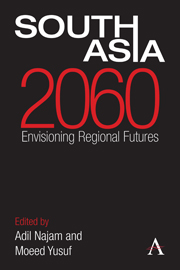Book contents
- Frontmatter
- Contents
- Acknowledgments
- List of Abbreviations
- Introduction: Imagining South Asian Futures
- Section I South Asia as a Region
- Section II State Relations
- Section III Development
- Section IV Human Well-Being
- Chapter 27 Population Dynamics, Economic Prospects and Regional Coherence
- Chapter 28 Towards Cooperation for Poverty Reduction?
- Chapter 29 Health Challenges
- Chapter 30 Regional Disease Dynamics
- Chapter 31 Education: Time Bomb or Silver Bullet?
- Chapter 32 Scholarship in and on South Asia
- Chapter 33 Rights and Justice: A Prospective View
- Chapter 34 Patriarchy, Power and Paradox: Dreaming Gender Equality and Development
- Chapter 35 Women in South Asia
- Chapter 36 Media: New Trends, Old Problems
- Chapter 37 Sports: Passion and Industry
- About the Authors
- Bibliography
- Index
Chapter 28 - Towards Cooperation for Poverty Reduction?
from Section IV - Human Well-Being
Published online by Cambridge University Press: 05 September 2013
- Frontmatter
- Contents
- Acknowledgments
- List of Abbreviations
- Introduction: Imagining South Asian Futures
- Section I South Asia as a Region
- Section II State Relations
- Section III Development
- Section IV Human Well-Being
- Chapter 27 Population Dynamics, Economic Prospects and Regional Coherence
- Chapter 28 Towards Cooperation for Poverty Reduction?
- Chapter 29 Health Challenges
- Chapter 30 Regional Disease Dynamics
- Chapter 31 Education: Time Bomb or Silver Bullet?
- Chapter 32 Scholarship in and on South Asia
- Chapter 33 Rights and Justice: A Prospective View
- Chapter 34 Patriarchy, Power and Paradox: Dreaming Gender Equality and Development
- Chapter 35 Women in South Asia
- Chapter 36 Media: New Trends, Old Problems
- Chapter 37 Sports: Passion and Industry
- About the Authors
- Bibliography
- Index
Summary
Regional integration is a postcolonial process, the objectives of which are not always clear-cut. On the face of it, the process may be initiated as a means to foster economic cooperation, with trade facilitation being the major outcome. The underlying purpose of integration is, however, more often than not, for countries to forge links to safeguard their long-term political and security objectives, and to minimize the possibility of armed conflict. The most obviously successful example of regional integration in recent times is of course that of the European Union, which has effectively precluded armed conflict in Western Europe for the last 60 years. The broader objective of the South Asian Association for Regional Cooperation (SAARC) is to promote socioeconomic development in the region, but an offshoot of that stated strategy would be the maintenance of peace and security in the long term.
Cooperation in South Asia has, however, the added dimension of possibly being a catalyst for long-term poverty reduction in a region where one billion people (of a total of 1.5 billion), or 66 percent of the population, live on less than $2 a day (World Bank 2010a). The past decade's average annual regional growth, estimated at 6 percent, gives some cause for hope, but masks significant disparity in economic performance across the eight countries that comprise the region. Further, the link between gross domestic product (GDP) growth and poverty reduction is not always clear – the latter generally does not follow from the former unless redistribution of wealth and income is affected as part of a larger government policy of equitable development.
- Type
- Chapter
- Information
- South Asia 2060Envisioning Regional Futures, pp. 221 - 228Publisher: Anthem PressPrint publication year: 2013



